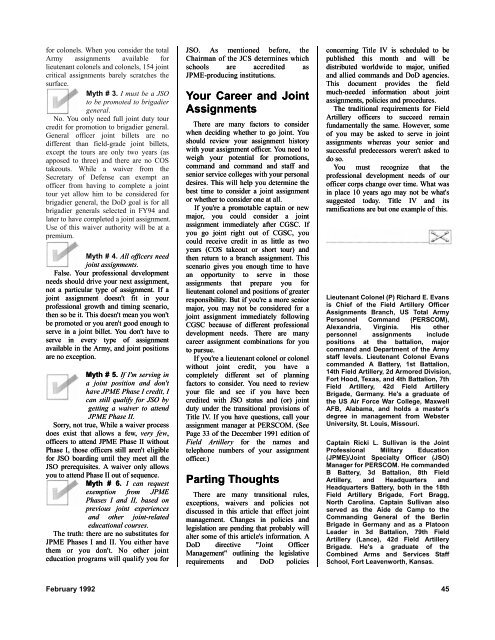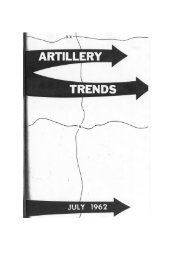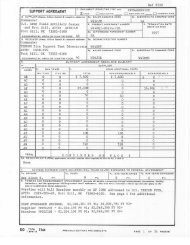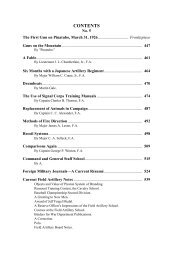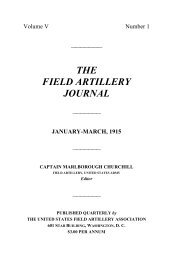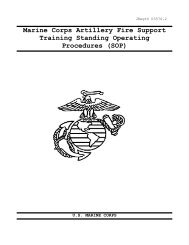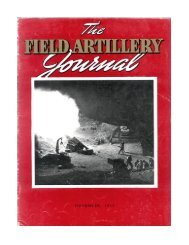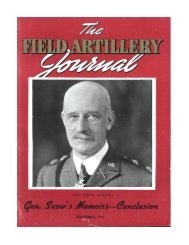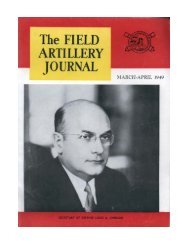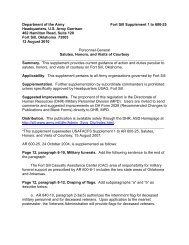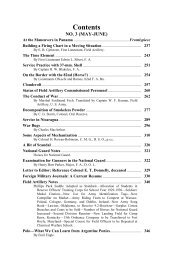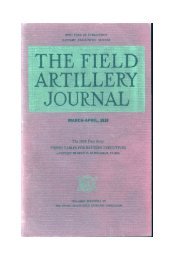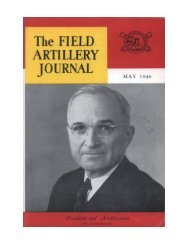February - Fort Sill - U.S. Army
February - Fort Sill - U.S. Army
February - Fort Sill - U.S. Army
Create successful ePaper yourself
Turn your PDF publications into a flip-book with our unique Google optimized e-Paper software.
for colonels. When you consider the total<br />
<strong>Army</strong> assignments available for<br />
lieutenant colonels and colonels, 154 joint<br />
critical assignments barely scratches the<br />
surface.<br />
Myth # 3. I must be a JSO<br />
to be promoted to brigadier<br />
general.<br />
No. You only need full joint duty tour<br />
credit for promotion to brigadier general.<br />
General officer joint billets are no<br />
different than field-grade joint billets,<br />
except<br />
the tours are only two years (as<br />
apposed to three) and there are no COS<br />
takeouts. While a waiver from the<br />
Secretary of Defense can exempt an<br />
officer from having to complete a joint<br />
tour<br />
yet allow him to be considered for<br />
brigadier general, the DoD goal is for all<br />
brigadier generals selected in FY94 and<br />
later to have completed a joint assignment.<br />
Use of this waiver authority will be at a<br />
premium.<br />
Myth # 4. All officers need<br />
joint assignments.<br />
assignments.<br />
False. Your professional professional development<br />
needs should drive your next assignment,<br />
not not a particular type of assignment. assignment. If If a<br />
joint assignment doesn't doesn't fit in your<br />
professional growth and timing scenario,<br />
then so be it. This doesn't doesn't mean you won't<br />
be promoted or you aren't good enough enough to<br />
serve in a joint billet. You don't have to<br />
serve in every type of of assignment<br />
available in the <strong>Army</strong>, <strong>Army</strong>, and joint positions<br />
are no exception.<br />
Myth # 5. 5. If I'm serving in<br />
a joint position and don't<br />
have JPME Phase Phase I credit, credit, I<br />
can still qualify qualify for JSO by<br />
getting a waiver to attend<br />
JPM JPM E Phase II.<br />
Sorry, not true, While a waiver process<br />
does exist that allows a few, very few,<br />
officers to attend JPME Phase II without<br />
Phase I, those officers still aren't eligible<br />
for JSO boarding until they meet all the<br />
JSO prerequisites. A waiver only allows<br />
you to attend Phase II out of sequence.<br />
Myth # 6. I can request<br />
exemption from JPME<br />
Phases<br />
I and II, based on<br />
previous joint experiences<br />
and other joint-related<br />
educational courses.<br />
The truth: there are no substitutes for<br />
JPME Phases I and II. You either either have<br />
them them or you don't. No other joint<br />
education programs will qualify you for<br />
JSO. As mentioned before, the<br />
Chairman of the JCS determines which<br />
s chools are accredited<br />
JPME-producing institutions.<br />
as<br />
Your Career and Joint<br />
Assignments<br />
There are many factors to consider<br />
when deciding whether to go joint. You<br />
should review your assignment history<br />
with your assignment officer. You need to<br />
weigh your potential for promotions,<br />
command and command and staff and<br />
senior service colleges with your personal<br />
desires. This will help you determine the<br />
best time to consider a joint assignment<br />
or whether to consider one at all.<br />
If you're a promotable captain or new<br />
major, you could consider a joint<br />
assignment immediately after CGSC. If<br />
you go joint right out of CGSC, you<br />
could receive credit in as little as two<br />
years (COS takeout or short tour) and<br />
then return to a branch assignment. This<br />
scenario gives you enough time to have<br />
an opportunity to serve in those<br />
assignments that prepare you for<br />
lieutenant colonel and positions of greater<br />
responsibility. But if you're a mo re senior<br />
major, you may not be consider ed for a<br />
jo int assignment immediately following<br />
CGSC because of different professional<br />
development needs. There are many<br />
career assignment combinations for you<br />
to pursue.<br />
If you're a lieutenant colonel or colonel<br />
without joint credit, you have a<br />
completely completely different set of planning<br />
factors to consider. You need to review<br />
your file and see if y ou have been<br />
cre dited with JSO status and and (or) joint<br />
duty under the transitional provisions of<br />
Title IV. If you have questions, call your<br />
assignment manager at PERSCOM. ( See<br />
Pa ge 33 of the December 1991 edition of<br />
Field Artillery for the names and<br />
telephone numbers of your assignment<br />
officer.)<br />
Parting Thoughts<br />
There are many transitional rules,<br />
exceptions, waivers and policies not<br />
discussed in this article that effect joint<br />
management. Changes in policies an and d<br />
l legislation<br />
egislation are pending that probably will<br />
alter some of this article's information. A<br />
DoD directive "Joint Officer<br />
Management" outlining the legislative<br />
requirements and DoD policies<br />
concerning Title IV is scheduled to be<br />
published this month and will be<br />
distributed worldwide to major, unified<br />
and allied allied commands and DoD agencies.<br />
This document provides the field<br />
much-needed information about joint<br />
assignments, policies and procedures.<br />
The traditional requirements requirements for Field<br />
Artillery officers to succeed remain<br />
fundamentally fundamentally the same. However, However, some<br />
of you may be be asked to serve in joint<br />
assignments whereas your your senior and<br />
successful predecessors predecessors weren't asked to<br />
do so. so.<br />
You must recognize that the<br />
professional development needs of our<br />
officer corps corps change over over time. What was<br />
in place 10 10 years aa<br />
go may not be what's<br />
su ggested today. Title IV and its<br />
ramifications are but one example of this.<br />
Lieutenant Colonel (P) Richard E. Evans<br />
is Chief of the Field Artillery Officer<br />
Assignments Branch, US Total <strong>Army</strong><br />
Personnel Command (PERSCOM),<br />
Alexandria, Virginia. His other<br />
personnel assignments include<br />
positions at the battalion, major<br />
command and Department of the <strong>Army</strong><br />
staff levels. Lieutenant Colonel Evans<br />
commanded A Battery, 1st Battalion,<br />
14th Field Artillery, 2d Armored Division,<br />
<strong>Fort</strong> Hood, Texas, and 4th Battalion, 7th<br />
Field Artillery, 42d Field Artillery<br />
Brigade, Germany. He's a graduate of<br />
the US Air Force War College, Maxwell<br />
AFB, Alabama, and holds a master's<br />
degree in management from Webster<br />
University, St. Louis, Missouri.<br />
Captain Ricki L. Sullivan is the Joint<br />
Professional Military Education<br />
(JPME)/Joint Specialty Officer (JSO)<br />
Manager for PERSCOM. He commanded<br />
B Battery, 3d Battalion, 8th Field<br />
Artillery, and Headquarters and<br />
Headquarters Battery, both in the 18th<br />
Field Artillery Brigade, <strong>Fort</strong> Bragg,<br />
North Carolina. Captain Sullivan also<br />
served as the Aide de Camp to the<br />
Commanding General of the Berlin<br />
Brigade in Germany and as a Platoon<br />
Leader in 3d Battalion, 79th Field<br />
Artillery (Lance), 42d Field Artillery<br />
Brigade. He's a graduate of the<br />
Combined Arms and Services Staff<br />
School, <strong>Fort</strong> Leavenworth, Kansas.<br />
<strong>February</strong> 1992 45


